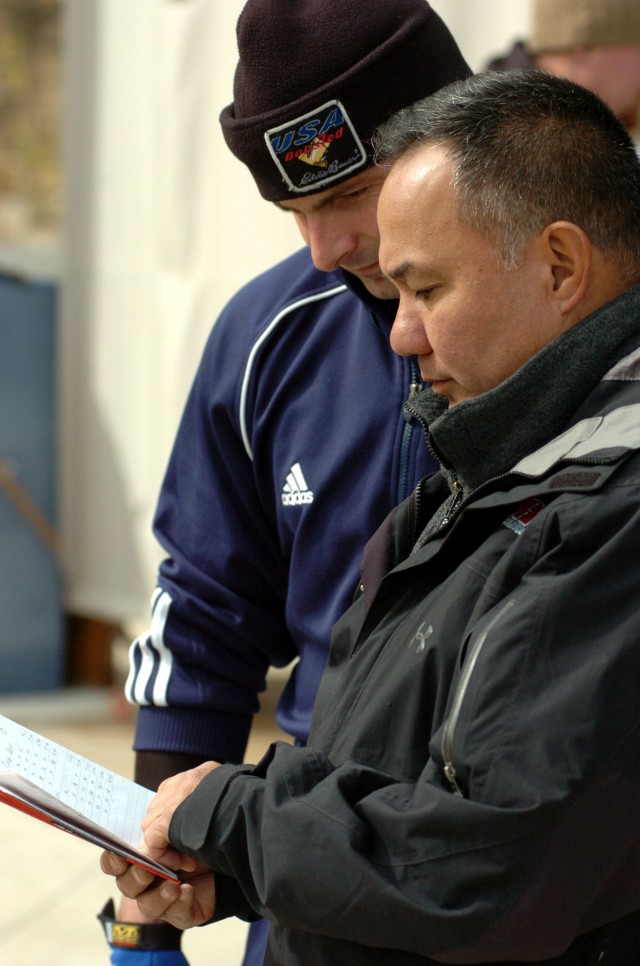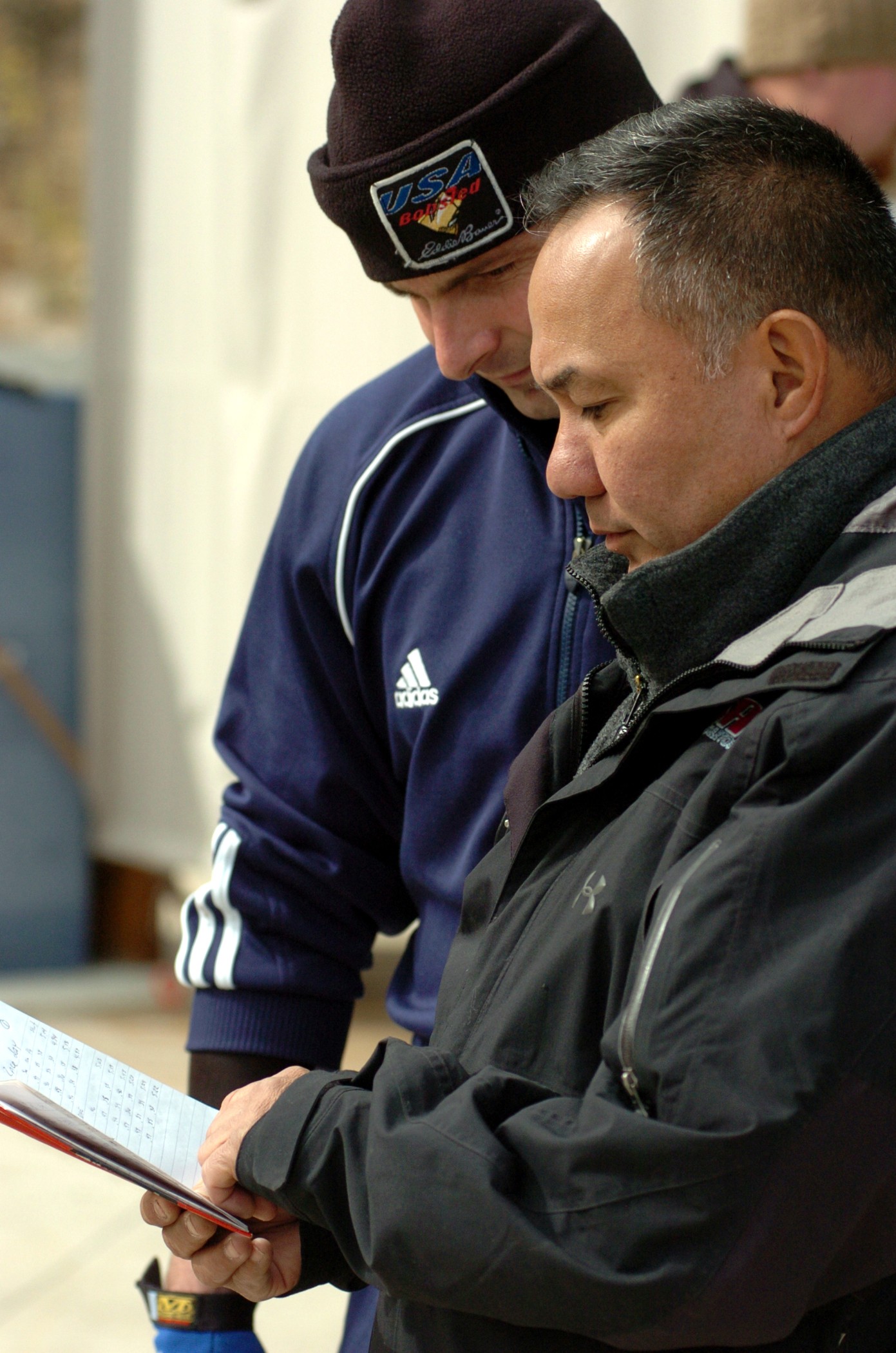WHISTLER, British Columbia - U.S. Army World Class Athlete Program bobsled coach Sgt. Bill Tavares was the man behind Team USA's athletes as they blasted off the starting block throughout the 2010 Olympic Winter Games at Whistler Sliding Centre.
Tavares, 46, a five-time Olympian from Lake Placid, N.Y., considers manning the sleds a labor of love that keeps him young because the Olympic experience never grows old. There's a lot of testosterone in the air - a whole bunch of high-fiving, fist-banging, hooting and hollering - as the athletes psych themselves for the fastest possible 30-meter push of a sled.
Whether it was two-man, women's or four-man competition, Tavares was the man wrapped in a red, white and blue star-studded coat standing behind Team USA's bobsledders atop the mountain in Whistler.
"It feels great," said Tavares, who assisted U.S. bobsled head coach Brian Shimer, who awaited sleds at the finish line. "It's pretty cool being at the top. We know right away if we're standing good or it's going to be work for the driver to make it down. "
Tavares and Team USA were ultimately rewarded Feb. 27 when former WCAP Soldier Steven Holcomb drove the "Night Train" team of Justin Olsen, Steve Mesler and Curt Tomasevicz to Olympic gold in the four-man event.
"Each team has their own little ritual," Tavares said. "The women are a little calmer, a little quieter. Holcomb's team, those guys are probably one of the most intense groups around. They are push-happy. When they're going to go, you know you can be witness to greatness."
Team Holcomb's victory ended a 62-year Olympic men's gold medal bobsled drought for Team USA, but Tavares led American women to the podium frequently during that stretch.
In 1998, Tavares was named head coach of the U.S. women's bobsled team. Four years later, he led WCAP Spc. Jill Bakken and Vonetta Flowers to the first gold medal in women's Olympic bobsled history at the 2002 Winter Games in Park City, Utah, where the event debuted for women. That was another monumental victory because it marked Team USA's first Olympic bobsled medal of any color in 46 years, and Flowers became the first African-American to medal in the Olympic Winter Games.
"I've been lucky to be part of two gold-medal appearances at the Olympics," Tavares said. "I was the head coach for the inaugural women's bobsled team in 2002 when they won the gold medal, and now this one is the icing on the cake."
Tavares completed basic training in 1982 and has spent 27 years as a Soldier in the Army and National Guard. He competed at the 1992 Winter Olympics in Albertville, France, where he teamed with Wendel Suckow to finish ninth in luge doubles.
Tavares was named 1999 Developmental Coach of the Year by the United States Olympic Committee, signaling the continuation of another phase of his athletic life - all while serving in the Army.
Tavares coached WCAP bobsled pilot Sgt. Shauna Rohbock and Valerie Fleming to a silver medal at the 2006 Olympic Winter Games in Cesana Pariol, Italy, where they claimed the lone bobsled medal for Team USA. He also backed Erin Pac and Elana Meyers, who teamed to win the women's bronze at Whistler aboard Team USA II.
"The women have medaled in every Olympic event since I've been coaching with them," Tavares said. "And now the men have finally won their gold medal. It's just great to be a part of that. What makes it amazing is that gold medal was won on foreign soil. It's always good to win the World Championships and Olympic gold on foreign soil."
All told, Tavares had a coaching hand in Team USA winning two Olympic gold and one silver medals, one gold, two silver and three bronze medals at the World Championships, and another 70 medals on the World Cup circuit.
"So I've had a good turn," said Tavares, who intends to continue coaching. "And now we've won a World Championship and an Olympic gold medal with Steve Holcomb, and he's one of our own."
Team USA attended an awards party at the USA House after the four-man bobsled medal ceremony was completed at Whistler Medals Plaza.
"Each of the four gold medalists got up and said something about the coaches and staff that helped them get there," Tavares said. "It wasn't 'I did this, I did that, and this is why I won the gold medal.' It was 'because of all these other people that helped me, this is why we won the gold medal.' I'll tell you, these boys have class."
Tavares thinks Soldier-athletes have an advantage over their civilian peers.
"I think WCAP athletes from any sport have the biggest upper hand on any other athlete because this is sport, it's not the end of the world," he said. "And WCAP athletes have a better understanding of that than any other athlete that I know.
"We can be deployed at any time. Let's get some things under perspective here: we know what our jobs are. We might be athletes and coaches now, but we're Soldiers. This is sport. We're doing our job that we're tasked to do now, but at any time, we could be with the unit and shipped over."
Regardless of the outcome, no one can erase Tavares' golden Olympic memories.


Social Sharing